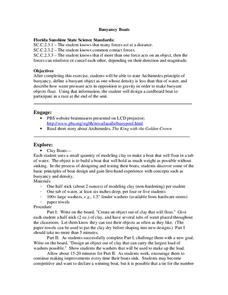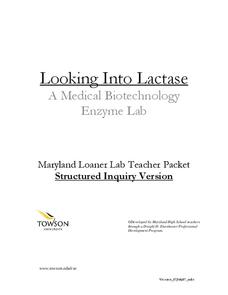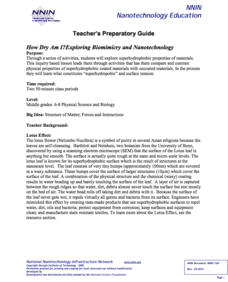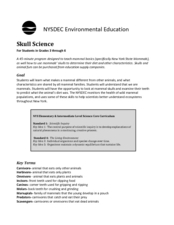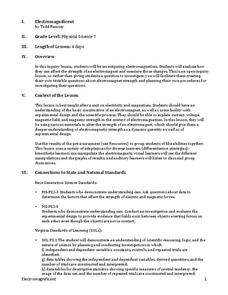National Science Teacher Association
Middle School Sampler: Science
Focus on inquiry-based learning in your science class with a series of activities designed for middle schoolers. A helpful packet samples four different texts, which include activities about predator-prey relationships, Earth's axis and...
Royal Society of Chemistry
Acids and Bases—Microscale Chemistry
Here's proof that small-scale labs lead to big-time learning. Introduce acid-base interactions to middle school scientists through a microscale chemistry lab. Pupils combine a variety of solutions and use indicators to obtain approximate...
ReadWriteThink
Webcams in the Classroom: Animal Inquiry and Observation
Boost observational skills with an inquiry-based lesson that takes scholars on a virtual field trip. With help from webcams, learners observe animals in a zoo or aquarium. Observations go into a journal and a discussion is held to review...
Oregon State
World Map of Plate Boundaries
Young geologists piece together the puzzle of plate tectonics in an earth science lesson. Given a physical map of the world, they search for land formations that indicate the location of different types of plate boundaries.
Purdue University
Global Design for the Seasons
People don't all get the same amount of sun at the same time of the year. Collaborative groups explore how the motion of Earth contributes to the idea in an inquiry-based STEM lesson. Learners first investigate how the rotation of Earth...
Center for Precollegiate Education and Training
Buoyancy Boats
What did the sea say to the boat? Nothing, it just waved. An inquiry-based lesson starts with a simple concept on the Archimedes Principle and challenges pupils to make something out of clay that floats. Then, they design an object out...
Berkshire Museum
Meet a Naturalist: Researching, Writing, Interviewing
Young scholars reach out into the community and learn about different environmental science careers in this inquiry-based instructional activity. Beginning with a short research assignment, children gain background knowledge about...
Curated OER
Ornithology and Real World Science
Double click that mouse because you just found an amazing lesson plan! This cross-curricular Ornithology lesson plan incorporates literature, writing, reading informational text, data collection, scientific inquiry, Internet research,...
Curated OER
Playing With Science
Young scientists investigate the scientific concepts and principles that help make common toys such as hula hoops, yo-yos, slinkies, and silly putty work. As a class, they read "Backyard Rocket Science, Served Wet" to get a look behind...
NOAA
Biological Oceanographic Investigations – Call to Arms
How many simple machines does it take to make a robotic arm? An inquiry-based lesson explores that topic and challenges pupils to build a robotic arm that can stretch, turn, and more. A few questions help guide them in the right...
Astronomical Society of the Pacific
Getting Ready for the All American Eclipse!
Give your pupils a front row seat at the biggest light show in the sky this year! In addition to admiring the total solar eclipse, young astronomers can explain the phenomenon with a little help from an inquiry-based lesson. The focus of...
Towson University
Looking Into Lactase: Structured Inquiry
Why is lactase important? Biology scholars explore enzyme function in a structured inquiry lab. The activity tasks lab groups with observing how temperature and pH affect enzyme activity, as well as determining which milk products...
California Academy of Science
Human Evolution
As the great and hilarious Tim Minchin once said, "Science is simply the word we use to describe a method of organizing our curiosity." Science is more than just a guess; it is based on questions, observations, and evidence. High...
National Nanotechnology Infrastructure Network
How Dry am I? Exploring Biomimicry and Nanotechnology
Help your classes feel like they can walk on water! An engaging inquiry-based lesson has young scholars experiment with different surface coatings. They make observations about their properties and how they relate to the surface tension...
Curated OER
Daphina Science, The Method of Investigation
Students determine what causes a reaction in a species of Daphnia. In this ecology based lesson, students are in a hands on project to demonstrate a controlled experiment with data collections. Students use laboratory tools in this...
Curated OER
Autism and Autism Spectrum Disorders: Disorders Extending Beyond the "Norm"
Learners develop an understanding of autism by engaging in an inquiry-based discussion. Pupils are exposed to the vast array of defining characteristics of autism spectrum disorders. They create posters about the developmental...
Baylor College
What Dissolves in Water?
One of water's claims to fame is as the universal solvent. Young physical scientists experiment to discover which materials dissolve in this special compound. You could never be more prepared for teaching this lesson than by using this...
Science 4 Inquiry
The Ups and Downs of Populations
Life has its ups and downs ... especially if you're an animal! Biology scholars engage in a population study through an inquiry-based lesson. Pupils work together to explore the factors that affect deer populations, then examine the...
Curated OER
Skull Science
What can your class learn from a skull? With proper facilitation, they can learn about diet, physical adaptations, special differences, and even the environment. Pupils will examine a series of mammal skulls and pelts to help them...
Serendip
UV, Mutations, and DNA Repair
How effective are cells at repairing UV damage? An inquiry-based lesson has learners experiment with organism by exposing them to various levels of UV light and then examining their DNA after a period of time. Pupils test different...
National Nanotechnology Infrastructure Network
Hiding Behind the Mask
Microchips are a man-made wonder. Investigate the manufacturing wonder with a hands-on inquiry-based lesson. Scholars simulate the process of pattern transfer using photoresist. Their conclusion identifies how their process replicates...
STEM for Teachers
Electromagnificent
This physics pun really hertz, but this STEM lesson plan can help. The inquiry-based activity has young scientists create a testable question about electromagnetic strength; plan and implement their own experiments; and record and...
NASA
Producers Make Their Own Food
During an inquiry-based activity, scholars decide which variable to test and then design an experiment to determine the needs of producers. After two weeks, they complete a full analysis and research paper.
Baylor College
Heart Rate and Exercise
What is the relationship among the heart, circulation, and exercise? Your class members will explore first-hand how different physical exercises affect an individual's heart rate. They will begin by learning how to measure their own...







